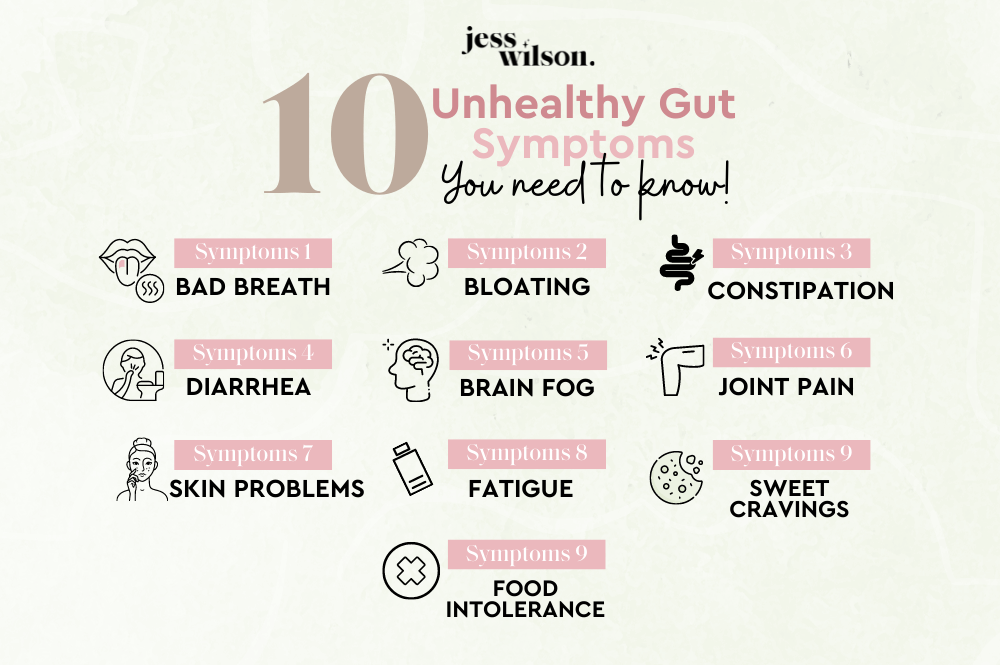Whenever you hear the phrase “gut health,” you might think of how well your stomach digests meals. And, while digestion is a vital function of gut health, your gut also has a direct impact on your overall health.
Many variables influence your gut health, including your family and genetic history, as well as the structure of your body. So it’s safe to say that signs of an unhealthy gut may be affected by numerous factors. If the health of your gut is compromised, a lot could happen.
So,what is poor gut health?… and what are the signs of gut health issues you have to look out for? I’ll show you 10 Unhealthy Gut Symptoms… And if you experience any of them, I can help.

1. Bad Breath

Bad breath and gut health may be interlinked. One of the signs of a bad gut is “halitosis”, sometimes known as foul breath. This has become a serious personal issue because of how it impacts one’s self-esteem and interactions with others. Because of the embarrassing nature of this ailment, it is frequently kept untreated.
You may have foul breath after eating food that has a strong disagreeable odour or after not brushing your teeth for an extended length of time. All of these are common and mild cases of foul breath. Chronic halitosis, on the other hand, may be more problematic because it may be a symptom of underlying health conditions that affect more than just your oral cavity and should be thoroughly examined.
Excess bacteria in the small intestine can result in excessive volumes of rotten-smelling gases and belching, giving your breath an unpleasant odour .Most people who have terrible digestive system breath describe it as smelling like rotten eggs. This is because gut microbes degrade sulphur, creating an eggy-smelling gas. For some individuals however, the scent is more nasty and terrible.
2. Bloating

Bloating and food cravings are telltale signs that something is wrong with our gut. Bloating is extremely widespread, affecting 16-31% of the general population. Fortunately, it’s usually a temporary issue that goes away on its own, sometimes caused by a huge meal or a gas-producing food.
However, for other people, bloating is a persistent condition that produces moderate to severe symptoms and has a detrimental impact on their quality of life. Do you have this symptom? Try out my Gut E-course! Through my programs, you’ll get to do it your way, in your own time, but still with full support from me. And that means, that no matter where you are in the world, or how busy your schedule is, we can still work together.
Bloating is a symptom of too much gas in our gastrointestinal system. Bloating and burping can occur for a variety of causes, the most common of which being what and how we eat or drink. When we eat or drink something and there aren’t enough digestive enzymes in our stomach to dissolve it for further digestion, our food will repeat on us’ in an attempt to add more digestive enzymes and break it down again. It could also be connected to food allergies.
3. Constipation

Constipation is a widespread digestive issue, with studies claiming that up to 25% of the world’s population suffers from this persistent, and often socially restricting, ailment. Although certain populations are more affected than others, constipation is a problem that everyone will face at some point in their lives.
But it is also important to know that constipation can be caused by dysbiosis, which is an imbalance in the gut microbiota. Constipated patients frequently have a considerably different gut bacteria composition than non-constipated healthy people, with higher quantities of methane-producing bacteria in their intestines, which reduces intestinal transit time.
A healthy microbiome can minimise methane production, improve stool quality and frequency, and alleviate constipation indications such as bloating, stomach pain, and discomfort.
4. Diarrhea

Symptoms such as frequent diarrhea can be more than just an annoyance, it could be one of the bad gut health symptoms you have to look out for. If you see persistent signs of poor digestive health, you may be suffering from a serious gastrointestinal problem. A healthy gut is normally operating properly when you have one to two well-formed and easy-to-pass bowel movements every day. What causes gut bacteria imbalance are excess bacteria which frequently induce diarrhea and may result in weight reduction and malnutrition.
Prolonged diarrhea caused by an acute intestinal illness, food poisoning, laxatives, medical intervention, or other conditions can literally wash out all of the bacteria in your gut.
5. Brain Fog

One of the symptoms of a bad gut could also be brain fog. Confusion, forgetfulness, and a loss of attention and mental clarity are all symptoms of brain fog.
The gut and the brain communicate constantly and intimately. In fact, your gut is sometimes referred to as your “second brain” by scientists. So it is not surprising that poor gut health has an impact on the brain and can induce symptoms of brain fog. For example, some people have cognitive fog after eating specific foods that cause inflammation in the gut, such as gluten. If you have digestive issues, your gut may be contributing to your brain fog.
6. Joint Pain

Many are suspicious of the premise that digestive disorders might cause or worsen arthritis symptoms. However, research strongly implies that there are links between leaky gut, the gut microbiome, and arthritis.
According to new research, bacteria in the gut, known as the gut microbiome, may be the cause of arthritis and joint pain especially in obese people. Changes in the gut microbiome correspond to symptoms of systemic inflammation, notably in the knees. For gut bacteria symptoms, your body’s immune system reacts by producing antibodies that attack and kill these antigens. An immune complex forms when an antibody attaches to an antigen. Persistent leaky gut increases the production of these inflammatory cytokines, which circulate throughout your body and deposit in various tissues and organs, including—you got it—skeletal the muscles and joints, causing more inflammation.
7. Skin Problems

Signs of poor gut health could also show in your skin! When the gut is unhealthy, a dysfunctional stomach can have a significant impact on our entire health, including the appearance of our skin, including spots, inflammation, eczema, and rosacea. The gut microbiome is a community of bacteria present in your intestines that affects your entire health, particularly your skin.
According to studies, when there is gut inflammation, there will also be skin inflammation. Persons with a healthier gut microbiota have a healthier lipid profile in the skin, which means their skin is more hydrated, moisturised, and defended.
8. Always Feeling Tired

People who suffer from chronic fatigue may have gastrointestinal imbalances. Insomnia or poor sleep caused by an unhealthy stomach can contribute to weariness. The gut produces the majority of your body’s serotonin, which regulates mood and sleep. As a result, when there is bacteria or inflammation within the gut, your sleep may suffer.
And, as we observed with the gut-brain connection, the link between rest and gut health is a two-way street. Sleep is essential for maintaining a healthy gut. Check out these Sleep Remedy Capsules that are gut-friendly!
9. Craving Sweets

A large sugar appetite may be an unanticipated indicator of poor gut health. According to research, gut microorganisms emit proteins that function similarly to hunger-regulating hormones, influencing not just our food desires but also our mood.
Bacteria are exactly like us! Or, at the very least, they are in the sense that various microorganisms prefer different sorts of nutrients. Some thrive on carbohydrates, while others thrive on dietary fibre or certain lipids, and yeast especially thrives on sugar.
As a result, some argue that the more you indulge in certain needs, the more the microorganisms that influence those cravings develop. This feeds the cycle, causing an imbalance in your gut with sugar-loving, pro-inflammatory bacteria taking over, potentially leading to additional health issues.
10. Food Intolerance

Food intolerances are thought to be caused by poor quality bacteria in the gut. This can result in problems digesting the trigger foods as well as unpleasant symptoms such bloating, gas, diarrhea, stomach discomfort, and nausea.
Food intolerances impact approximately 20% of the population. And, even though they are not life-threatening, they can indeed be incredibly destructive. If you have this problem, check out my Recipe eBooks full of recipes without the consequence of common food intolerances – gluten and dairy free!
Gut health is linked to other parts of your health, so it’s important to look after it.
During digestion, microorganisms in your gut produce vitamins, send signals to the immune system, and produce compounds that alter how the brain functions. If your gut or microorganisms aren’t working properly, they can send messages to your brain, affecting your mood and other parts of your health.
If you are experiencing any of the aforementioned symptoms or conditions and believe that gut dysfunction is the main reason, reach out to me and let me help you. Healing the gut is a process. If you’re seeking some advice and motivation, I’m here to help. As a Functional Nutritionist, I can provide you with solutions that are fit for you and you alone! Because all of us are different…
Frequently Asked Questions
What are the Symptoms of an Unhealthy Gut?
Frequent discomfort, gas, bloating, constipation, diarrhea, and heartburn may indicate that your gut is struggling to process food and eliminate waste. You are frequently exhausted. People who suffer from chronic fatigue may have gastrointestinal imbalances.
How do I know if I have bad gut health?
When your gut is working properly, there is a healthy balance of bacteria that helps your body process and obtain energy from the foods you eat, eliminate toxins, fight sickness, and improve your mood. You also have no diarrhea, constipation, loose stools, gas, bloating, or abdominal pain.
When your gut is out of balance, your body may have difficulty absorbing nutrition, losing fat, and regulating blood sugar. Bacterial overgrowth or a shortage of nutrients can induce weight loss or gain. Your skin is irritated. Some skin disorders, such as acne, eczema, and psoriasis, may be linked to digestive issues.
How do You Fix an Unhealthy Gut?
You may be able to enhance your gut health by altering your lifestyle and food. Diet and gut health seem to be inextricably related. It is likely that limiting processed foods, fatty foods, and foods containing refined sugars is essential for keeping a healthy microbiome, as these foods may stimulate the proliferation of harmful bacteria.
How Can I Reset My Gut Health?
The greatest method to promote a healthy gut is to live a healthy, low-stress lifestyle that prioritises sleep, exercise, and plant-based diets. If you only do one thing, change your diet to incorporate more whole foods and fresh veggies. This will have the most impact.
How Do You Test if Your Gut is Healthy?
How to know if your gut is unhealthy could be tricky. While some indications, such as indigestion, mood problems, and skin illnesses, may indicate gut imbalances, these precise relationships can only be determined through testing. Here is where microbiome testing could come in handy.
If you have chronic digestive troubles or other health concerns that aren’t improving despite lifestyle modifications, see a doctor. It may also be beneficial to keep a food diary before your appointment so that your doctor can detect any potential triggers.
You can also check out available testings for you. I do comprehensive testing and a tailored healing protocol that’s right for you. It is the best way to make sure that we are addressing your gut and hormone imbalances right from the root.
What can Poor Gut Health Cause?
According to research, food intolerances, such as lactose intolerance, may be caused by low bacterial health in the gut. This can result in difficulty digesting the trigger foods and symptoms such as bloating, gas, diarrhea, stomach pain, and nausea.
What Causes Gut Bacteria Imbalance?
Poor sleep quality, alcohol intake, and inactivity are all factors that can affect your gut bacteria. Alternatively, the best method to ensure good gut flora is to live a healthy lifestyle that includes frequent physical activity, low stress, and a variety of whole foods. A lack of diversity in gut bacteria has been associated with weariness, chronic fatigue, and sleep disorders such as insomnia and restless sleep. The gut produces serotonin, a hormone that influences sleep and mood.





